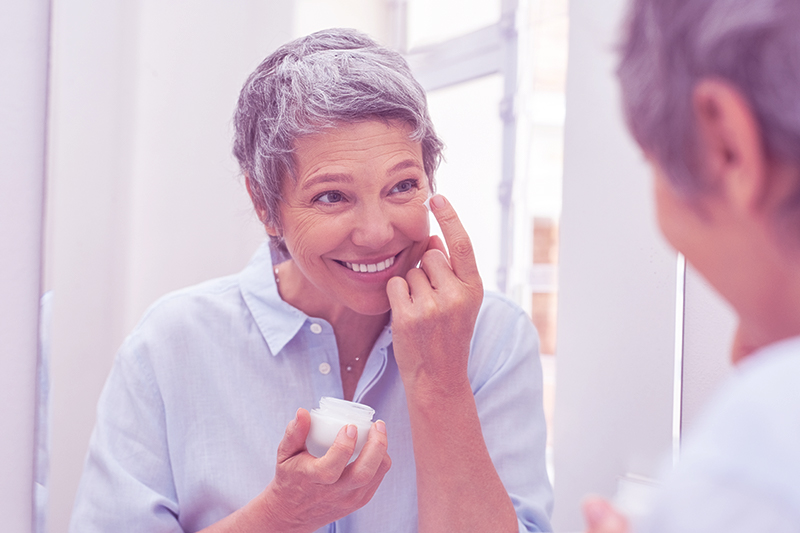
Did you think that all of your skin woes would disappear after puberty? Join the club. From adult acne, dry skin to psoriasis, it turns out that there are a number of skin issues that can arise with aging skin. And though many of us are all too familiar with vaginal dryness because of menopause, the drop in estrogen that happens during perimenopause can wreak havoc on your skin in other ways, too.
But don’t despair. There are countless treatments to help your skin looks its best. Here are some of the myths — and truths — about menopause and skin.
1. Menopause causes dry skin.
True. In fact, dry skin leading up to and after menopause is very common. Estrogen stimulates collagen and oils in the skin that keep it moisturized. When estrogen levels drop, as they do after 40, it’s common to experience dry and itchy skin. It might feel as though your entire body has suddenly transformed into the Sahara Desert — from your face to your elbows to your vagina.
So what can you do? Essential fatty acids found in salmon, walnuts, and fortified eggs can help your skin’s oil barrier, and you could opt for an omega-3 supplement. You should switch to unscented soap or one that is formulated for sensitive skin and avoid hot showers, which can dry out skin even more. And stay hydrated.
2. Dry skin is the only skin-related menopause symptom.
False. With lower estrogen and potentially higher levels of testosterone, sebaceous glands can go into overdrive, which gives the appearance of oily skin and can lead to acne. If your skin is really oily, blotting papers can do wonders.
3. There’s no real treatment for acne related to menopause.
False. Your dermatologist can help you with solutions, though it can be challenging to treat because traditional acne medications are designed for teens and can be too harsh for aging skin. A treatment with salicylic acid for sensitive or combination skin will help unclog pores without drying your skin out. Products with retinol can be helpful for treating acne, too. Your doctor may prescribe a one, but there are over-the-counter products with retinol.

4. Sunscreen is even more important after 40.
True. Aging skin may be more sensitive to the sun and the decline of estrogen leads to a decline in melanocytes, which can make you more prone to sun damage. Sun damage happens when ultraviolet (UV) light hits unprotected skin, causing DNA changes at a cellular level. A broad spectrum SPF will help prevent age spots, wrinkles, and cancer. Use it even in winter — and don’t forget the backs of your hands.
5. There’s no way to treat hyperpigmentation.
False. Hyperpigmentation, or dark patches on your skin, is more common after 40. Since estrogen helps regulate melanin, when estrogen declines you’ll be more prone to hyperpigmentation and other types of sun damage, one reason sunscreen is so important. To treat it, use a serum or moisturizer with a high concentration of vitamin C, which is known for its ability to fade dark spots fast. Retinoids can be a powerful remedy for hyperpigmentation caused by acne. A dermatologist might recommend a peel or a laser treatment.
6. Menopause causes wrinkles.
True — kind of. Menopause itself doesn’t cause wrinkles, but the decline of estradiol before and after menopause can cause the skin to age faster. And when estrogen drops, fat deposits get redistributed. When the supportive fat under the skin of the face is reduced, skin sags and wrinkles. There are a lot of options for treating wrinkles, including Botox, fillers, laser resurfacing, dermabrasion, and more.
7. All moisturizers are the same.
False. There are some ingredients that really target dry skin without irritation and nourish aging skin better than others. Most experts agree that hyaluronic acid is effective for building the skin’s moisture barrier. Antioxidants like vitamin C, vitamin E, and green tea are helpful, too. If you’re experiencing severely dry skin all over your body, mineral oil can be an ideal treatment. For vaginal dryness, a high-quality moisturizer that doesn’t drip may be your new best friend.
Trying to establish a new skin care routine? Let us help.